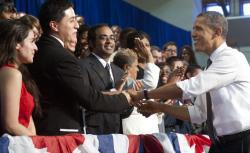Remember when people wanted the president to get angry? Reporters poked him to let off a little steam over AIG bonuses. There were calls again during the BP oil spill. Now Obama gets mad all the time. On Tuesday, he called out House Majority Leader Eric Cantor. Last Saturday, the venue was the Congressional Black Caucus dinner. Claiming Republicans don’t want to pass anything that would give the president a victory, he has taken to saying: “Give me a win? Give me a win? Give me a break.”
The most hopeful presidential campaign in a generation is likely to be followed by the most depressing one. The domestic economic situation is bad. The European collapse means things are likely to get worse. The political reality is just as ugly. Congress can barely meet the minimum requirements of the office—keeping the government running—and both the Republicans and Democrats look like they’re going to run catastrophe campaigns: “Elect the other guy,” they say, “and we can’t be responsible for the calamities that ensue.” The choice will be between deepening the disaster the president has put you in and the disaster a Tea Party-controlled Republican president will visit on you.
Great.
Republicans have been hitting the president since his first month. They get him coming and going. He is both a feckless blob incapable of solving the current economic crisis and a hyperactive liberal whose unprecedented market-meddling is forcing America into ruin. Obama is not just a bad president, but a threat to the viability of the American experiment. That’s what these sustained discussions of American exceptionalism are about.
For his part, Obama didn’t start out the year with such a grim approach. He wanted to Win the Future! That’s what his State of the Union speech was about. Americans can do anything! He used to drop the WTF phrase in every speech. It sounded almost like the successor slogan to Change You Can Believe In. Now he says it less frequently. (The last time was Sept. 26.) He still talks about a promising future, but he brings in the dark clouds for the more powerful appeal: America is under threat.
The most notable use of this idea was born in his critique of Rep. Paul Ryan’s budget. He said it would lead to a “fundamentally different America.” Now the charge shows up more frequently. In the fights over his jobs package, he says the GOP threatens the “quintessentially American idea” that everyone should pay his fair share. When Republican candidates failed to condemn the booing of a gay soldier at a recent presidential debate, he used the occasion to remind Americans that “we don’t believe in a small America.” Speaking to a joint session of Congress recently, he said the Republican vision is “not the story of America.”
Monday the president’s campaign released a memo about Obama’s possible Republican opponents. Whoever wins the GOP nomination, the president’s team is going to put him in a three-cornered hat. “The campaign to win the Republican nomination has become a campaign to win the hearts and minds of the tea party,” wrote the president’s campaign press secretary.
This may rally the base, but it may also be attractive to highly educated swing voters if Obama can make the case that it is Republicans who are posing the threat. That’s why it’s helpful to paint the party by its most extreme elements now, as they play out in the carnival of the primary—to define the party before Republicans pick a less threatening candidate like Mitt Romney.
The Tea Party is unpopular. Congressional Republicans are unpopular. A leading GOP candidate doesn’t believe in climate science or evolution. The accumulation of negative data “frightens a lot of voters who are open to the Republican economic message and have gone cold on Obama,” argues one veteran Democratic strategist. Or, as another party veteran put it, the strategy is to: “win ugly.” This may be the president’s best option, because as he demonstrated this week, it’s impossible to give a satisfying answer to the question Ronald Reagan posed in 1980: Are you better off?
Winning ugly isn’t uncommon in politics. But this campaign could be a long way from the one Obama ran in 2008, promising to change the political system. Republicans will spend the next 14 months reminding him of that. New Jersey Gov. Chris Christie adopted the “more in sorrow than in anger” tone last week as he read Obama’s past statements about lowering partisanship. In responding to the president’s hard line on his jobs bill, Republican lawmakers ask him to drop his “my way or the highway approach,” the same cliché he used to toss at them.
The president and GOP candidates will still talk about optimism and big plans for the future. This is required rhetoric for an American politician. But it’s not optimism for its own sake; it’s just another bedrock American virtue under threat of a bad election result. This isn’t new—even the ever optimistic Reagan was a pessimist when he needed to be in the 1980 campaign, talking about the Carter economy and the threat from the Soviets.
It seems wrong to end a piece on the shriveled state of optimism on a gloomy note. So an optimist might argue that the election might seem darkest now because one of the unofficial competitions of any primary is to mint increasingly baroque denunciations of the incumbent. Michele Bachmann announced she wants to impeach Obama. The eventual Republican nominee will have to embrace optimism at some point—even if it’s just a little detour from the main plan like a policy speech on education. When will president Obama leave off railing? That’s harder to say. He doesn’t have many options.
